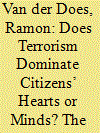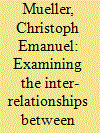|
|
|
Sort Order |
|
|
|
Items / Page
|
|
|
|
|
|
|
| Srl | Item |
| 1 |
ID:
183013


|
|
|
|
|
| Summary/Abstract |
Terrorism only poses a small risk to people but tends to be a major source of public fear. Through fear, terrorism has far-reaching implications for public governance. In this paper we look at trust in government as a potential mitigating factor of fear of terrorism. We discern between calculative trust, based on analytical assessment of previous and expected future actions, and relational trust, based on emotions and perceived value similarity with government. We find that relational trust decreases fear of terrorism. A similar but less robust negative relationship exists between calculative trust and fear. However, our regression analyses suggest that relational trust, in fact, may mediate the relationship between calculative trust and fear of terrorism. In other words, the more citizens think government is able to prevent terrorist attacks and feel that authorities are doing enough, the more they, in turn, feel that their government shares their values, and the less fearful they are of future terrorist attacks.
|
|
|
|
|
|
|
|
|
|
|
|
|
|
|
|
| 2 |
ID:
168858


|
|
|
|
|
| Summary/Abstract |
The current field study used unique data collected in Israel in July 2014, during a military operation that the Israel Defence Forces (I.D.F.) conducted in the Gaza Strip, in reaction to the thousands of missiles launched from there into Israel. During this operation, the new Iron Dome anti-missile defence system was used to protect Israelis exposed to missile attacks. The study examined factors that correlate with decisions to comply with I.D.F. defence instructions regarding behaviour during missile attacks. In addition, the study examined the relationship between attitudes towards the Iron Dome technology and emotions, risk perceptions, and the decision to comply with I.D.F. defence instructions. The results indicate that stronger positive opinions towards Iron Dome were correlated with lower levels of fear and anger, and beliefs that participant’s chances of being injured by a missile were lower than they had been during previous military operation. In addition, better compliance with I.D.F. defence instructions correlated with being more fearful, angrier at Hamas, living closer to Gaza Strip, and having more positive opinions about Iron Dome. The findings also indicate gender differences with respect to factors correlated with risk perceptions, opinions regarding Iron Dome, and precautionary actions during attacks.
|
|
|
|
|
|
|
|
|
|
|
|
|
|
|
|
| 3 |
ID:
175030


|
|
|
|
|
| Summary/Abstract |
This study contributes to the literature by examining the effects of four particular determinants of public attitudes towards power grid expansion projects, namely residents' perceived procedural fairness, their trust in actors involved in the planning procedure, their risk expectations, and their perceived benefits. By accessing data collected from residents living along and in the wider area of a controversially discussed grid expansion project in Germany, a theoretically derived path model was tested empirically by means of structural equation modeling. The findings revealed that perceived procedural fairness directly affected residents’ trust in actors and indirectly influenced their risk expectations, their perceived benefits, and attitudes. Trust exerted a significant influence on risk expectations, perceived benefits, and attitudes, whereas risk expectations and perceived benefits significantly affected attitudes. Overall, the findings provide novel insights into specific mechanisms that shape public attitudes towards the construction of new HVTLs and suggest that it is crucial for the competent planning authorities and transmission system operators to provide fair information and participation measures and establish a trustworthy relationship to local residents affected by the infrastructure project.
|
|
|
|
|
|
|
|
|
|
|
|
|
|
|
|
|
|
|
|
|